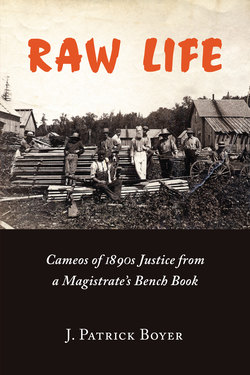Читать книгу Raw Life - J. Patrick Boyer - Страница 5
На сайте Литреса книга снята с продажи.
Message to Readers
ОглавлениеCommon Humanity
Raw Life shows the experience of our pioneer ancestors on those often challenging days when the rule of law and the rough tumble of life intersected with raw honesty in Magistrate’s Court.
The “raw life” of earlier times is not diluted or glossed over here by extracting its essence or generalizing its features; instead, the book presents these original moments in time in the actual words of the people involved, providing those reading them in our present times with both astonishment and amusement. We get the straight goods as they appeared on the record.
These cases from more than a century ago offer a unique way to glimpse life and learn history. For although each case on its own may be a very small snapshot indeed, this book resembles a composite photo album. It imparts an overall impression of how social and economic conditions refract through the justice system, and in doing so it portrays the culture of a community, the legal framework of a country, and the timeless face of humanity.
The diverse scenes are grouped according to themes, ranging from “early road rage” to “women’s fears and women’s fates,” from “hard love for the indigent” to “the high price of stolen goods.” Reproducing the proceedings in their original form gives a contemporary reader an opportunity to sense the rhythms of small-town life and low-life action, without mediation or “interpretation.” The cases are often troubling, but sometimes heartwarming. Overall, they show in the administration of justice how individuals on the bench seek to provide even-handed treatment for a most uneven assortment of claims and prosecutions.
R. Roy McMurtry: “common humanity uniting us all.” (Photo: David Batten, Toronto)
Law and the administration of justice are not abstract phenomena. To be understood and appreciated, they must always be seen in context. Patrick Boyer sets the scene for these cases by first providing that historical setting: portraits of those who served as justices of the peace; and background history about the community in which these vignettes of crime and justice unfolded. We see the evolution of the office of justice of the peace, but we also glimpse in the lives of JPs themselves that the rawness of the times was often as much a part of their own experience as of the men and women arraigned before them in the courtroom.
Although I have known Patrick as a friend for over four decades, it was a revelation to learn more about his ancestor magistrate in the chapters describing James Boyer and his times. It is clear that “raw life” was what everyone in Magistrate’s Court experienced, including the justice of the peace himself. In the lesson of that man’s life, we are reminded that all of us are human, even when we occupy a public office. Despite many differences that demarcate us, one from another, as individuals, our common humanity is the greater link uniting us all.
It is rightly said that justice delayed is justice denied, but it is equally true that justice delayed is the undoing of a healthy social order. That is why the lowly justice of the peace occupies a high rank, or deserves to, in a country where they serve to quickly address individual grievances and misdemeanours with front-line justice, so that these are not allowed to fester during delay, or go unanswered and grow over time into bigger crimes or deeper social injustices.
The human stories embedded in these episodes that Patrick refers to as “the small change of history” — in comparison to more historic or noteworthy cases from higher courts — put a personal face on an earlier Canadian society that, though vastly different in culture and technology, is eerily like our own in its humanity. Raw Life offers a rare dose of realism, one that demolishes false nostalgia for “the good old days” even as it fosters a sense of optimism about humanity’s enduring resilience.
In the book’s final chapters, Patrick draws out many of the parallels between the 1890s and our present era, while also noting what has changed. The land of Canada is much the same, even though our way of living on it has altered dramatically. The laws of Canada still engage the same challenges, even though they have been reformed and expanded to meet new conditions. What we see in Raw Life, through the workings of the Canadian justice system at its lower reaches, is how we share in common with our ancestors the reality of human character being tested in a variety of difficult circumstances.
Patrick Boyer previously made a contribution to preserving our legal heritage with A Passion for Justice, his masterly biography of Canada’s remarkable jurist and law reformer, J.C. McRuer. Now, with Raw Life, Patrick displays his continuing commitment to this field, and once more displays his writer’s skills by integrating solid research, important history, and direct evidence from the courtroom itself. Most astonishingly, he also provides a compelling, and unusual, tribute to his ancestors.
Honourable R. Roy McMurtry, O.C., O.O., Q.C.
